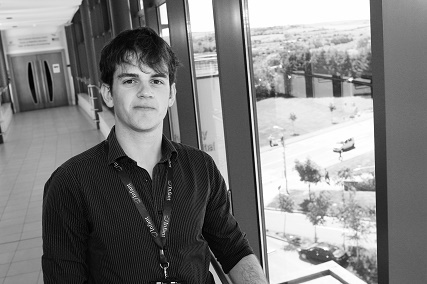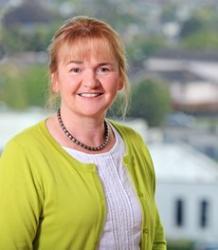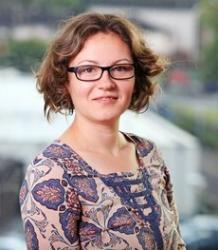Ms Soraia Ventura
PhD Title: Electroencephalographic Study of the Effect of Massage on Infant Sleep
Soraia's background is in Neurophysiology and her main interests are within the area of Electroencephalography. After gaining relevant experience in the clinical field, Soraia is currently working on the Electroencephalographic Study of the Effect of Massage on Infant Sleep and is supervised by Prof Geraldine Boylan and Dr Sean Mathieson.
Parent-led baby massage is known to provide environmental enrichment through tactile stimulation and bonding between babies and their parents. We aim to test if routine parent-led massage during the first four months of life may be associated with brain development. Our study participants were split into two groups soon after birth: routine massage (intervention) and non-massage (controls). Using EEG at four months of age, I am studying sleep spindles which are brain maturational markers measured during specific stages of sleep. We will compare these between intervention and control groups.
This study will also be the largest to describe sleep spindles in detail during this critical stage of development.

Dr Andrea Bowe
PhD Title: Identifying and Predicting Below Average Intellectual Function in Childhood
Andrea is a public health medicine SpR and ICAT fellow. Her PhD will focus on prediction of neurodevelopmental outcomes using epidemiological data and machine learning.
Mr Richard Harris
PhD Title: Connected Health Avenues for Adolescent Mental Health
The aim of this project is to review Child and Adolescent Mental Health Services (CAMHS) with the aim of developing a connected health application to support the provision of these services.
Initial stages of the project will involve communication with the relevant stakeholders, including clinicians, policy makers and services users, to understand the needs of these groups. This will allow us to clearly identify the key requirements for this connect health application. This communication will take the form of focus groups, surveys and interviews, as well as any other relevant research methods that provide the appropriate level of academic rigor.
Following the identification of the key requirements, a design science research methodology will be employed to develop and test the application, with the end goal of creating an application that will best serve the needs of CHAMS. Publications are expected at various stages throughout the project.
Dr Jacopo Proietti
PhD Title: Clinical And Neurophysiological Detection In asphyxiated neonates, aimed at Determining an Accurate selection for hypothermic Treatment in the Early neonatal period (The CANDIDATE Study)"
Jacopo is a MD specialist in Child Neuropsychiatry, trained in pediatric neurological disorders with particular interest in neonatal neurology and electrophysiological evaluation of epilepsy. His PhD research project is focusing on multimodal assessment of infants with Neonatal Hypoxic Ischaemic Encephalopathy during the earliest hours after birth, performed through video-EEG-polygraphy and simultaneous somatosensory evoked potentials combined with detailed neurological examination. This approach will potentially provide novel insights for the clinician and improve the ability to identify those infants who will benefit from early treatment. This is a collaborative project between the INFANT Research Centre and University of Verona (Italy).
Ms Mary-Ann Ryan
PhD Title: Sleep architecture development of the mid to late preterm infant and correlation with neurodevelopmental outcome- The SLEEPi study
Mary-Ann is a registered general nurse with specialist registration in paediatrics and midwifery.
Mid to late preterm infants (MLP)( 32-36+6 weeks gestation ) are born at a critical period of brain development. Sleep is essential for neurosensory cortical development, physical growth and brain formation in the preterm infant. Deprivation of sleep, (active or quiet sleep) has been associated with impaired development and loss of brain plasticity. In the NICU emphasis is placed on recording of cardiorespiratory vitals with less placed on monitoring the trajectory of neurodevelopment throughout stay. As the main behavioural state of the premature newborn, the objective information of sleep wake cycling as recorded on EEG/ aEEG monitoring, provides a valuable contribution to the standard clinical neurologic evaluations and clinical practice.
This is a single centre observational study carried out in southern Ireland. Participants (n=101) are healthy /clinically stable MLP infants, admitted to the neonatal unit at birth. An overnight video EEG / aEEG carried out before 36+6 weeks gestation or prior to discharge. A modified neonatal version ( reduced montage) of the international 10/20 system was used when recording EEG , with ECG and respiratory activity also monitored. The 12 hour time frame analysed and annotated was similar for all recordings (+/- 2 hrs) commencing with the onset of active sleep. Standard of care was not altered whilst recordings were in progress.
All participants were invited to return to for developmental assessment and full head EEG at 4 mths corrected age and a developmental assessment at 18 months corrected age. Findings were correlated with a group of healthy term infants at the same ages.
Graduated in 2024
Dr Andreea Pavel
PhD Title: Study of electroencephalogram, heart rate variability and clinical parameters as early biomarkers of encephalopathy in newborn infants
Hypoxic-ischaemic encephalopathy (HIE) is the most common cause of neonatal encephalopathy, associated with a high risk of death and lifelong disability. Therapeutic hypothermia is currently the only treatment recommended for moderate and severe HIE cases. There is a 6-hour widow to assess an infant at risk of HIE and decide if therapeutic hypothermia might be beneficial. Several studies show that the sooner you start the treatment, the more effective it is. Unfortunately, there is no treatment recommended for mild HIE, although we now know that 20-40% of infants with mild HIE have a poor neurodevelopmental outcome. The initial neurological assessment is sometimes unreliable to differentiate between HIE grades and sometimes is very difficult to accurately select the infants that might benefit from cooling and that might have a poor outcome, especially in the mild spectrum. We need new strategies to obtain a quick and accurate diagnosis of HIE severity by adding new early biomarkers for HIE grade and outcome prediction.
The main aim of Andreea's PhD is to assess the early physiological biomarkers in HIE: to add to the clinical features, that we are currently using in practice, the most predictive electroencephalographic (EEG) and heart rate variability (HRV) features. She will also characterise the standard EEG and HRV features seen in all HIE grades, and identify those features that are most predictive of poor neurodevelopmental outcome.
Graduated in 2024
Dr Michael Carter
PhD Title: PiRAMiD: Predicting early onset Autism through Maternal Immune Activation and Proteomic Discovery
Michael is investigating the role maternal immune activation (MIA) during pregnancy plays in causing Autism Spectrum Disorder in offspring. He is characterising a cohort of ASD affected children and their parents alongside matched controls and their parents. All participants were previously enrolled in BASELINE. He is comparing their clinical features as well as elements of their inflammatory profile. Through cytokine analysis we hope to identify specific inflammatory signatures during pregnancy while may correlate with ASD in offspring.
Graduated in 2024
Dr Aisling Garvey
PhD Title: Multimodal Assessment of Newborns at Risk of Neonatal Hypoxic Ischaemic Encephalopathy
Aisling's area of interest is Neonatal Encephalopathy. Hypoxic Ischaemic Encephalopathy (HIE) is the leading cause of acquired brain injury in newborns. This study focuses on the early neurophysiological changes that occur following birth in infants with HIE and whether the evolution of these changes can predict eligibility for therapy and long term outcome. By incorporating clinical findings, blood biomarkers and very early physiological biomarkers of injury, this study aims to identify more rapidly and accurately infants at highest risk.
| Dr Yvonne D'Art |
|---|
| MSc Title: Single dose food challenges in the diagnosis and management of cow's milk allergy in infants Yvonne is currently undertaking research for her MD. Her study has recruited 60 cow's milk allergic infants between Cork University Hospital and OLCH Crumlin. 40 of them were given a single dose milk challenge with 0.015mls of milk (this is the dose at which only 5% are expected to react-the ED 05) and 20 did not receive the milk challenge. Both groups are started on the same programme of home introduction of milk using the milk ladder. They will be followed up for one year post recruitment.The mothers are completing Food Allergy Quality of Life (FAQL) and State and Trait anxiety(STAI) questionnaires at intervals during the year. The primary outcome measure will be level of milk tolerance achieved by 6 months post randomisation/challenge. Secondary outcomes will be changes in FAQL measures from randomisation to 1,3,6 and 12 months post randomisation and changes in serum levels of milk and milk-component specific IgE and IgG4 from 0-6 months in each group. |
| Sophie Casey |
|---|
 |
| PhD Title: Temporal Identification of the Molecular Alterations in Disorders of Neurodevelopment. As a graduate neuroscientist and current PhD candidate in paediatrics, Sophie’s current research on hypoxic ischemic encephalopathy (HIE) is at the crossroads of both areas. Her PhD project focuses on the identification of circulatory biomarkers in multiple established animal models of HIE and the determination of the functional downstream targets and effects of these markers in cell models. Sophie is also investigating the inflammatory profiles in maternal serum samples with the aim of determining whether maternal immune dysfunction pays a causal role in the development of autism spectrum disorders (ASD). Sophie’s research ultimately aims to provide novel insights into the roles of early molecular (microRNA and cytokine) alterations in the circulation on neurodevelopment and the effects of microRNA manipulation in the relevant cell models. |
| Rhodri Llyod |
|---|
 |
| PhD Title: Electroencepalography of Prematue Infants In this thesis, Rhodri aims to progress current knowledge of EEG in very preterm infants <32 weeks gestational age (GA) by investigating its ability to assess neurological wellbeing and to predict neurodevelopmental outcome at 2 years. Furthermore, his aim to investigate and described the frequency and characteristics of electrographic seizures during the early postnatal period in the very preterm infants, and compare this to the existing literature. In addition, he aims to develop a standardised scheme for assessing both the normal and abnormal EEG features of preterm infants according to post-menstrual age. Finally, he will investigate the EEG of preterm twins and assess EEG concordance between monochorionic-diamniotic (MCDA) and dichorionic-diamniotic (DCDA) twins. . |
| Marc O'Sullivan |
|---|
 |
| PhD Title: Liquid Biopsy in the Newborn Marc O’Sullivan is a National Children’s Research Centre, Crumlin, funded PhD candidate with the Department of Paediatrics since 2014. His research originally focused on core temperature variations of infants with Hypoxic-Ischemic Encephalopathy. His PhD is focused around miRNA profiling in cord blood for both neonatal growth and brain development. This work is in infants that experienced early rapid weight gain prior to childhood obesity, and infants born with perinatal asphyxia respectively |
Department of Paediatrics & Child Health Department
Péidiatraic agus Sláinte Leanaí
Contact us
Floor 2, Paediatric Unit, Cork University Hospital, Wilton, Cork, T12 DC4A






